
Luis Gallego Condori is a Bolivian lawyer and politician who served as a member of the Chamber of Deputies from Potosí, representing circumscription 39 from 2010 to 2015.

Franz Gróver Choque Ulloa is a Bolivian industrial engineer, lawyer, and politician who served as vice minister of employment, civil service, and cooperatives from 2019 to 2020. A member of the Social Democratic Movement, he previously served as a party-list member of the Chamber of Deputies from Oruro from 2010 to 2014 on behalf of the National Convergence alliance and as a member of the Constituent Assembly from Oruro, representing circumscription 32 from 2006 to 2007 on behalf of the Social Democratic Power alliance.

Jaime Medrano Veizaga is a Bolivian mineworker and politician who served as a member of the Chamber of Deputies from Oruro, representing circumscription 36 from 2010 to 2015. Born to a mining family from Catavi, Medrano spent much of his life in Huanuni, site of one of the largest tin mines in the country. He spent much of his career as a company worker for the Huanuni Mining Corporation, serving as a sectional leader and as the mine's industrial safety inspector. In the alliance between the mining sector and the Movement for Socialism, Medrano broadly represented all of Huanuni's mineworkers in the Legislative Assembly, though he was primarily affiliated with the area's minority salaried company workers, noted for their frequent conflicts with the much larger group of cooperative workers over control of the most productive repositories.
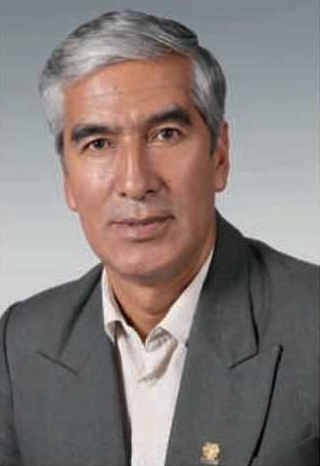
José Félix Mendieta Villarroel is a Bolivian politician and trade unionist who served as a member of the Chamber of Deputies from Cochabamba, representing circumscription 28 from 2010 to 2015.

Rhina Aguirre Amézaga was a Bolivian disability activist, politician, and sociologist who served as senator for Tarija from 2010 to 2015.
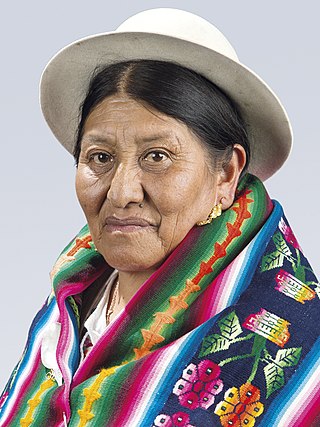
Plácida Espinoza Mamani is a Bolivian educator, politician, and trade unionist who served as senator for Oruro from 2015 to 2020.
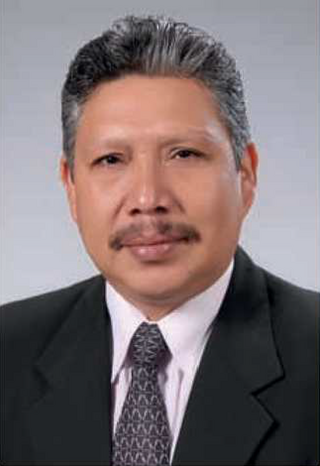
Edgar Luis Fernández is a Bolivian cab driver, politician, and trade unionist who served as a party-list member of the Chamber of Deputies from Santa Cruz from 2010 to 2015.

René Vidal León was a Bolivian politician and trade unionist who served as a party-list member of the Chamber of Deputies from Chuquisaca from 2010 until his death in 2012. He previously served on the Sucre Municipal Council from 2000 to 2004.
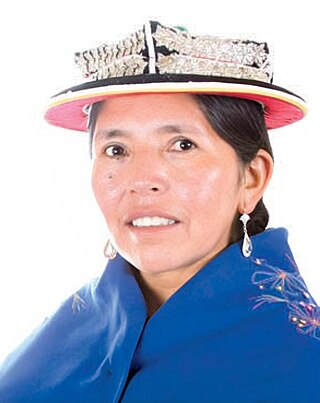
Carmen García Mamani is a Bolivian academic, politician, and trade unionist who served as senator for Potosí from 2010 to 2015. A member of the Movement for Socialism, she previously served on the Tomave Municipal Council from 2000 to 2005.
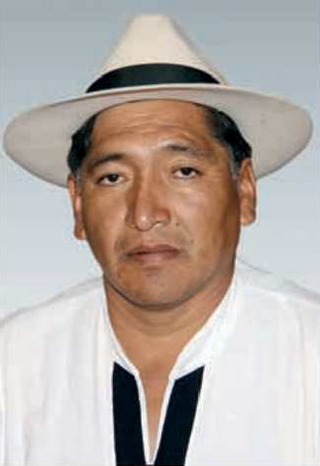
Freddy Germán Huayta Véliz is a Bolivian community organizer and politician who served as a party-list member of the Chamber of Deputies from Oruro from 2010 to 2015.

Martha Poma Luque is a Bolivian politician, trade unionist, and textile artisan who served as senator for La Paz from 2010 to 2015.
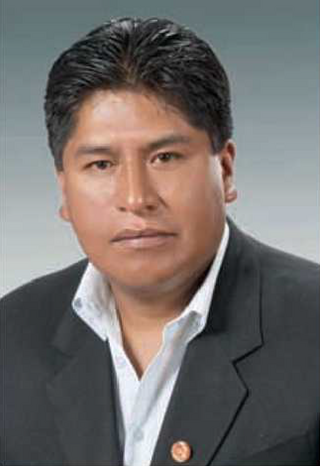
Osvaldo Guillermo Torrez Arisaca is a Bolivian community organizer and politician who served as a member of the Chamber of Deputies from La Paz, representing circumscription 11 from 2010 to 2015.

Julia Figueredo Paniagua is a Bolivian agricultural worker, politician, and trade unionist who served as a party-list member of the Chamber of Deputies from La Paz from 2010 to 2015.

Patricia Mancilla Martínez is a Bolivian politician and trade unionist who served as a party-list member of the Chamber of Deputies from La Paz from 2010 to 2015. A member of the Movement for Socialism, she previously served on the Cairoma Municipal Council from 2000 to 2005.

Donato Rubén Callisaya Mayta is a Bolivian politician and trade unionist who served as a party-list member of the Chamber of Deputies from La Paz from 2010 to 2015.

Ana María Sempértegui Valdez is a Bolivian accountant and politician who served as a party-list member of the Chamber of Deputies from La Paz from 2010 to 2015.

Nelly Núñez Zegarra was a Bolivian nurse and politician who served as a member of the Chamber of Deputies from Oruro, representing circumscription 32 from 2010 to 2015.
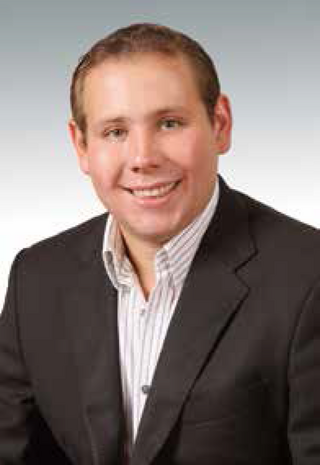
Carlos Eduardo Subirana Gianella is a Bolivian lawyer and politician who served as a member of the Chamber of Deputies from Santa Cruz, representing circumscription 50 from 2010 to 2015.

Jorge Adalberto Choquetarqui Jahuircata is a Bolivian community organizer and politician who served as a party-list member of the Chamber of Deputies from La Paz from 2010 to 2015.

Rodolfo Calle Inca is a Bolivian small businessman, lawyer, and politician who served as a party-list member of the Chamber of Deputies from La Paz from 2010 to 2015.




















